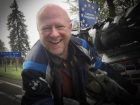I wake up to the sound of water splashing on the floor of my hospital room. A squatty lady in a smock holding a bucket of water hanging on her arm flicks water over the floor with her other hand. She leaves and quickly returns with a mop which she pushes through the room, under the beds and out the door.
What do you expect from a hospital in the middle of nowhere? The place is clean, the bed is comfortable and the only annoyance is whenever I ask for my urinal jar to be emptied, they never bring it back. I guess I have to ask permission to take a piss. My roommates get breakfast. I don’t. Haven’t eaten or drunken a thing since that last Vicadin. The doctor says they’ll put me under anaesthesia so the trauma doctor can reduce the fractures and re-splint the leg for my long journey back to the States.
(continued below the photographs that follow)
* * * * *
More shots from WorldRider’s last day in the saddle on the road from Potosà to Uyuni.
* * * * *
Around 9:30 Doctor Rolando appears. He looks disappointed and tells me the trauma doctor is here but won’t be able to attend to me until after he does his morning rounds. It might be 11:30 or noon until I can lose this cardboard box and get a real splint. Meanwhile, calls to MedJetAssist assure me that they are working on finding flights back to the United States. Last night they had asked for general information about the airport in Potosi, such as the length of the runway. I didn’t have a chance to measure it while in town, and the hospital personnel shook their heads and said not very long. They were considering another ambulance ride, but it would take 2-3 hours to get to Sucre and even longer to Santa Cruz where larger airports with commercial flights could be used to evacuate me.
Last night, Doctor Sylvia stayed with her parents who live in Potosi. Today she and Jeremiah were to take a bus back to Tica Tica where Sylvia could attend to other patients and Jeremiah would arrange to have Doc, my motorcycle, trucked back to Potosi. I suggested he get it back to the hotel we spent a couple nights before taking off on that fateful morning. They had underground parking and it seems would be open to storing the bike for a few days until I could figure out what to do with it.
Later, Jeremiah appeared at my bedside slightly panicked. “I can’t find her.†Referring to Sylvia who had told us that she would take the 7:30am bus. Jeremiah had been wandering the streets of Potosi this morning in search of an internet cafe, Doctor Sylvia and a bank that would take his ATM. Ever since arriving in Bolivia the ATM card issued by his local Colorado bank had given him problems. After three attempts in La Paz he finally succeeded in getting cash. In two days in Potosi no ATM machine worked.
Later the intern who masterfully managed to set up my IV checked in with me and in rapid fire Spanish with a difficult accent asked me for money. Geeez. Not a beggar in the hospital? No. But I couldn’t understand him as he pointed to one of the other patients in my room and talked about medicine from last night. Later Dr. Rolando explained that the local anaesthesia that he shot in my leg last night had been paid for and belonged to the other patient. In the early hours of the morning, when my groans, moans and severe pain were alleviated with the help of scissors and the shot, the pharmacy was closed. Accommodating my need for relief they used this patient’s medicine. It was up to me to provide the funds for reimbursement so it could be replaced. I also learned that the IV and pain medicine I received after my x-ray were borrowed from the intensive care unit. It amazed me how they kept track of all this. I was also happy that they were resourceful enough to accommodate this patient given the bizarre requirement of payment up front for goods and services.
Just before lunch my squatty lady appeared once again splashing water over the floor from the bucket hanging on her arm. Gotta keep that floor clean. Dr. Rolando showed up again, this time with a more positive look on his face. “They are preparing to take you to the casting room,†he said assuredly. “We must buy the anaesthesia and pay for the operating room. And you need another IV,†he asserted looking at the depleting sack of IV fluid hanging above my bed. I pulled a handful of Bolivianos from my neck pouch wallet and he shuffled off to the pharmacy only to return moments later with a bagful of goodies which he placed next to my bed.
A couple more hours pass. Still no word from MedJetAssist nor had I visited the casting/operating room. It was pushing 3 o’clock. And I was still waiting. Jeremiah and Sylvia showed up. I thought they were long gone, though in the back of my mind I couldn’t imagine him leaving without saying goodbye. At one point he said he’d stay until he was confident that MedJetAssist had a definitive evacuation plan. “She needs her blanket,†Jeremiah quipped as they stood bedside, “it belongs to the clinic.†Great. And I thought they came back to check in on me and say good bye. The blanket that they threw on me in Tica Tica had kept me warm and comfortable all night. But today I’d have to kiss it good bye. With the help of a nurse, Jeremiah and Doctor Sylvia wrested the blanked from under my frame and tucked it under their arms. Then they were off.
Now I was truly and officially alone in Bolivia. In the Daniel Bracamonte Hospital. Still no sign of the trauma doctor, but my bedside table was loaded with anesthesia and I had a receipt form the casting/operating room. Things couldn’t be better. Or could they?
Dr. Rolando appeared an hour later. “There’s a young boy who hasn’t eaten in two days. He must go first,†he apologized but stemmed my impatience and building anger from waiting with a bit of guilt. A young boy hasn’t eaten in two days. But I’m next in line. An hour later my water splashing lady came by my bed and handed me a cap that I needed to wear when in the operating room.
When they wheeled me into the operating/casting room sometime after 6pm I was greeted by an army of people dressed in blue scrubs. An elderly man sat on a bench in the corner. His mouth covered by a blue mask and beads of perspiration speckled his wrinkled brow. His eyes looked tired as he sat with his palms pressed deep into the cushion. Our eyes locked for a brief moment, then I swung my gaze to a women in a similar mask holding a syringe above her head. There was no sign of Doctor Rolando. I suddenly felt scared. Alone. This wasn’t the last thing I wanted to see should I never wake from a dose of Bolivian anesthesia.
“Esperarâ€, I cried. “Tengo que saber lo que usted va a hacer.â€
Silently I wondered what were all these people doing in here. I counted 7 or 8. The lady with the syringe assured me she was the anesthesiologist. Just then Doctor Rolando blasted through the swinging doors. I heaved a sigh of relief when I spotted a familiar face. He assured me this was light anesthesia and that I’d only be under for 10 minutes while they splinted my leg.
“Are you sure,†my voice slightly trembling.
“Claro!â€
They injected the anaesthesia into my IV and put an oxygen mask over my face.
I’m in Bolivia and I’m going under anaesthesia. And the last connection to my homeland was well on his way on a bus to Tica Tica. The unknown killed me. Then I was out.







